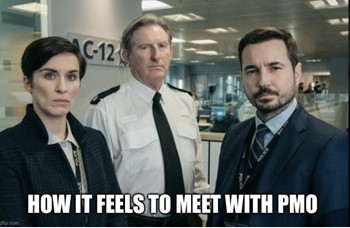Why The PMO Is The AC-12 Of Modern Business And MMO Is More Important Than Ever

If you’re a resident of the UK, you’ll no doubt be aware of the significant cultural impact of the BBC’s excellent, long running police corruption drama “Line of Duty”.
I spent my Easter Break catching up on the previous series’ in order to be able to watch along and contribute to the salacious gossip in the family group chat, dodging spoilers as I went.
It soon struck me how similar being in charge of a compliance PMO is to working in AC-12, Line of Duty’s rag-tag anti-corruption unit.
I have often utilised the term “PMO Police” to great effect in the work place, and whilst I’m not in hot pursuit of an OCG (that’s Organised Crime Gang to the uninitiated) or clutching a firearm when embedding process, I can’t help but draw the following comparisons:
- Much of PMO’s time is spent placing regulation paperwork in front of people and asking them to respond to it in a set timeframe (much like the famed Reg 15 disciplinary notice)
- Project Deep Dives and Health Checks can often feel like interrogations, with PMO building their case artefact by artefact to associated cries of “I’m not bent! I’ve just been too busy!” – as a poacher turned gamekeeper (PM to PMO Head) I am sympathetic however, anything you say may be taken down given in evidence – I don’t make the rules, I’m merely an enforcer
- Like AC-12, PMO can be unpopular and is often considered an area where process and compliance is perceived as a stick to beat people with rather than a tool for control and financial restraint – I encounter the most frustration and reluctance to comply with senior stakeholders who feel their authority is being challenged and with areas reliant upon delivering more reactive offers. These business units can often feel they’re being strangled with red tape and adherence to processes which feel both unfamiliar and unnecessary
More than anything, I draw comparisons to the strategic alignment of project portfolios and the famous MMO detection framework – Motive, Means, Opportunity.
Identifying this as a basic framework for whether PMO should accept projects into the pipeline of delivery is key to achieving what any good Compliance unit should – identification of doing the right thing for the business.

(Images: BBC/World Productions)
Motive in this context is your strategic need for delivery – does it move you in the right direction? Is it in line with an identified strategy and how does it help meet needs? Does it align to specified priorities and the future state of your organisation? What is the specific scope and is it benefit driven?
Means in a project context is predominantly cost and resources. Whilst we won’t be finding any wads of £50 notes in a brown Jiffy bag here, it’s true that an identified pot of of funding is one of the biggest barriers I have for entering projects into the pipeline. Who is paying for it? How accurate is the cost estimation? Have you considered project resourcing costs within the parameters of these costs?
Resources are a critical success factor but more often than not, an assumption is made that resources will be freed up to progress projects rather than prioritisation and slotting exercises taking place. Not making space within the portfolio to resource and slot projects is a sure fire way to trouble further down the line.
Opportunity usually relates to whether your PMO allows you to enter work into discovery or delivery without the above definitive information defined – this usually happens when people pull rank or instigate a bypass procedure – identifying the work as too important to subjugate to established practice.
Being the PMO Police can lead to many accusations of dragged feet on “Very Important Work” when actually the intent is to set the work up for success.
Kicking off projects at pace is critical but any experienced PMO lead will know that doing so without any strategic requirements, available resources or identified funding could be a potential death knell to delivery timescales, budgets and expected benefits further down the line.
Let’s not forget that projects have to meet very definite criteria to be labelled as such – projects must be temporary organisations, with defined budgets, resources and timescales, working towards a certain and unique scope of change across organisational disciplines.
In a time where more businesses than ever are putting in place additional financial approvals during the pandemic, checks and balances make a critical contribution to financial prudence and PMO processes can provide the vigilance and gate keeping required to keep business on the straight and narrow.
Stacey Forman is a project professional , speaker, women’s rights activist, and passionate advocate for women working in technology.
Stacey is fanatical about levelling the playing field for women in tech and other underrepresented workplaces and groups, championing introverts and thought diversity, compassionate leadership and wellbeing in the workplace.
You can connect with Stacey on Linkedin.




